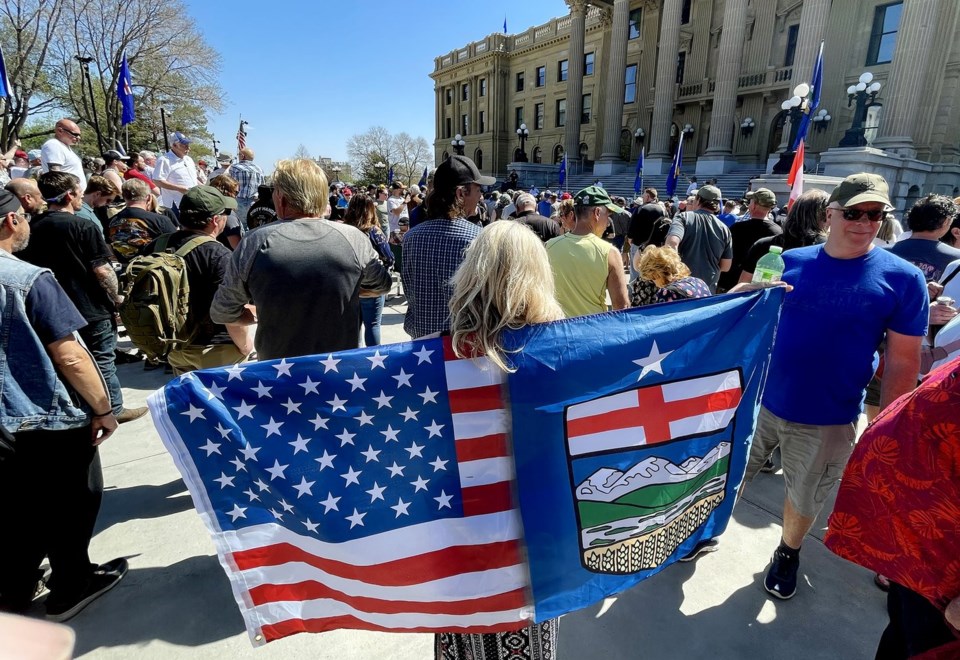OTTAWA — A new poll suggests more than half of Canadians say they understand why Alberta might want to split from Canada — even if almost two-thirds say they don't want that to happen.
The Leger survey, which polled 1,537 Canadians between May 16 and 18, suggests that 55 per cent of Canadians understand Albertans' desire for independence.
Because the poll was conducted online, it can't be assigned a margin of error.
Seventy per cent of Albertans said they understand why their province might want to become an independent country.
The poll suggests 63 per cent of men say they grasp what's driving Alberta separatism, while 48 per cent of women report the same.
While 77 per cent of Conservative voters said they understand the reasons behind the separatism movement, only 48 per cent of Liberal supporters responded the same way.
Sébastien Dallaire, Leger's executive vice-president for Eastern Canada, said the survey suggests that there's a "level of empathy" for Albertans. He added Canadians likely don't think it's a good idea for the province to separate, given the dire consequences it would have for the entire country.
"If you're in B.C., it means the country will be split in half from your perspective," Dallaire said. "If one province leaves, then it may open up, you know, more discussion about, of course, Quebec possibly also wanting to do the same, or other provinces."
Only 26 per cent of respondents said they support the idea of Alberta becoming an independent country, with 12 per cent saying they "strongly" support it and 15 per cent saying they support it "somewhat."
The numbers in the polling don't always match up due to rounding.
Sixty-two per cent of respondents said they're opposed, with 50 per cent saying they're "strongly" opposed, 13 per cent saying they are somewhat opposed and 11 per cent saying they "don't know."
Among respondents who support the province of Alberta becoming a country, 76 per cent say they understand why Alberta might want to become independent.
Alberta Premier Danielle Smith's government introduced a bill earlier this month to make it easier to launch a citizen-initiated referendum — including one on separating from Canada.
Smith has pointed to growing alienation in her province and frustration with Ottawa and has argued that those wanting to separate "are not fringe voices."
While she said she does not support separating from Canada, Smith is hoping to negotiate a new deal for the province with Prime Minister Mark Carney. She has said repeatedly that Albertans are frustrated that the province's natural resources are landlocked and that its oil and gas exports are sold almost exclusively to the United States at a cut rate.
Almost half of respondents in Alberta — 47 per cent — said they support separation.
Just 29 per cent of Quebecers, 22 per cent of Ontarians and 14 per cent of people in B.C. said they think Alberta should split. Though the poll's sample size for the two provinces was small, 30 per cent of people in Manitoba and Saskatchewan said they supported the idea.
At 43 per cent, Conservative supporters were far more open to the idea of separation than Liberal supporters, at only 12 per cent.
Dallaire said the results of the recent federal election "did not satisfy everybody."
He also said the poll suggests that Albertans are very divided on the issue of separation.
"We see that there is significant support for at least trying to shake things up," he said, adding that previous referendums in Quebec have shown that numbers tend to move quite a bit once people learn the facts about what separation would mean.
"Is this really a hard level of support? At this time, probably not, but it's a clear indication that there's a potential for the movement to really gain a strong foothold in the province and it's something to really keep an eye on," he said.
"There's a potential for this to grow even stronger, depending on what happens next."
The polling industry's professional body, the Canadian Research Insights Council, says online surveys cannot be assigned a margin of error because they do not randomly sample the population.
— With files from Sarah Ritchie
This report by The Canadian Press was first published May 23, 2025.
Catherine Morrison, The Canadian Press



